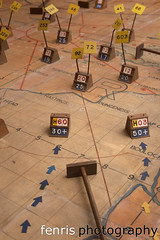A Middle East War AGAIN by Fen Oswin for Flickr
Indeed, even if they want to, the various sides might have trouble backing down enough to defuse today's explosive situation. After all, the Iranians continue to insist they have no intention of building a nuclear bomb, as much as Israeli and American officials insist that they are.
So, this prospective war with Iran -- like the one in Iraq -- is likely to come down to intelligence assessments on Iran's intentions and capabilities. And, as with Iraq's alleged WMD, the many loud voices claiming that Iran is on pace to build a nuclear bomb are drowning out the relatively few skeptics who think the evidence is thin to invisible.
For instance, the recent report from the International Atomic Energy Agency about Iran's supposed progress toward a nuclear bomb was widely accepted as gospel truth without any discussion of whether the IAEA is an unbiased and reliable source.
In framing the story in support of the IAEA, the major U.S. newspapers and TV networks ignored documentary evidence that the IAEA's new director-general was installed with the support of the United States and that he privately indicated to U.S. and Israeli officials that he would help advance their goals regarding Iran.
These facts could be found easily enough in WikiLeaks cables that the U.S. news media has had access to since 2010. Yet, the Big Media has ignored this side of the story, even as the IAEA report has been touted again and again as virtually a smoking gun against Iran.
This pattern of ignoring -- or downplaying -- evidence that runs counter to the prevailing narrative was a notable feature during the run-up to war with Iraq. It is now being repeated not just by the right-wing news media, but by the New York Times, the Washington Post, MSNBC and other centrist-to-left-leaning outlets.
The IAEA Cables
Thus, very few Americans know that U.S. embassy cables from Vienna, Austria, the site of IAEA's headquarters, revealed that the U.S. government in 2009 was celebrating its success in installing Japanese diplomat Yakiya Amano to replace Egyptian Mohamed ElBaradei, who famously had debunked some of President George W. Bush's claims about Iraq's supposed nuclear ambitions.
In a July 9, 2009, cable, American chargà � Geoffrey Pyatt said Amano was thankful for U.S. support of his election. "Amano attributed his election to support from the U.S., Australia and France, and cited U.S. intervention with Argentina as particularly decisive," the cable said.
The appreciative Amano informed Pyatt that as IAEA director-general, he would take a different "approach on Iran from that of ElBaradei" and he "saw his primary role as implementing safeguards and UNSC [United Nations Security Council]/Board resolutions," i.e. U.S.-driven sanctions and demands against Iran.
Amano also vowed to restructure the IAEA's senior ranks in ways favored by the United States. In return, Pyatt promised that "the United States would do everything possible to support his [Amano's] successful tenure as Director General and, to that end, anticipated that continued U.S. voluntary contributions to the IAEA would be forthcoming."
For his part, Amano stuck out his hand seeking more U.S. money, or as Pyatt put it, "Amano offered that a "reasonable increase' in the regular budget would be helpful."
Amano also rushed to meet with Israeli officials "immediately after his appointment," consulting with Israeli Ambassador Israel Michaeli and leaving Michaeli "fully confident of the priority Amano accords verification issues." That was another indication Amano's IAEA would take a hard line against Iran's alleged nuclear ambitions while ignoring Israel's undeclared nuclear arsenal.
Michaeli also revealed that Amano's public remarks about "no evidence of Iran pursuing a nuclear weapons capability" were just for show, designed "to persuade those who did not support him about his "impartiality.'" In reality, Amano intended to be anything but impartial.
(Note: You can view every article as one long page if you sign up as an Advocate Member, or higher).






